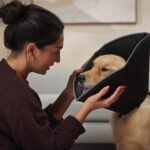All About Hip Dysplasia in Dogs: Signs, Treatment, and More

Photo by Khaligo/Adobe Stock
Hip dysplasia in dogs is a common concern among parents of large-breed dogs like German Shepherds and Great Danes. But the painful condition can affect pups of any size (and any age). While there is a genetic predisposition, how you care for your young dog plays a role in whether they’ll develop hip dysplasia.
We talked to two veterinarians all about hip dysplasia—the signs, the causes, the treatment—and the steps you can take to reduce your dog’s chance of developing complications if they do get it.
What Is Hip Dysplasia in Dogs and Puppies?
Canine hip dysplasia is a condition in which the hip joint grows and develops abnormally. These abnormalities lead to looseness in the joint (medically known as hip joint laxity).
This is usually due to an improper fit between the femoral head (the ball-like top of the thigh bone) and hip socket (acetabulum), according to Stacie Atria, DVM, holistic veterinarian and founder of Lotus Veterinary Alternatives in Alachua, Florida.
Over time, this improper fit can stretch the ligaments, muscles, and joint capsule around the hip joint, leading to degeneration and cartilage damage.
Hip dysplasia can be extremely uncomfortable for your pup. And, if left untreated, it can progress to osteoarthritis (degenerative joint disease), which comes with its own set of symptoms and related issues.
What Are the Symptoms of Hip Dysplasia in Dogs?

Christine Bird/Adobe Stock
Because it’s so uncomfortable, there are many clinical signs of hip dysplasia. That being said, dogs often try to hide their distress, so you may not see all of these signs, even if the disease has progressed.
Some of the most common symptoms of hip dysplasia are:
- Decreased activity
- Bunny-hopping
- Abnormal gait
- Loss of muscle mass
- Decreased range of motion
- Stiffness
- Pain
- Hind leg lameness (may be chronic or occasional)
- Joint cracking or popping
- Sitting in abnormal positions
- Having trouble jumping onto furniture or into cars
- Difficulty going up stairs
While any dog of any age can show a number of the above signs, the symptoms of hip dysplasia in puppies often differ a little from what you might see with older dogs.
Puppies with hip dysplasia may have a reluctance to play, a bunny-hopping gait, or difficulty rising, says Dr. Atria. Adult dogs might show decreased range of motion, limping, or a “swaying” walk.
According to Texas A&M Veterinary Medical Teaching Hospital, many dogs start showing signs of hip dysplasia around 6–12 months, but don’t show pain until they’re older. Sometimes, the signs of hip dysplasia will start to improve after the puppy’s body creates scar tissue in an effort to compensate and support the loose hip joint. However, it’s still an abnormal joint, and the symptoms will return as the dog grows older and develops arthritis.
What Causes Hip Dysplasia in Dogs?
Hip dysplasia doesn’t have one known cause. Instead, it usually develops due to a combination of factors, like genetic predisposition and diet—both overfeeding (rapid weight gain) and poor nutrition.
That said, these are the most common risk factors for hip dysplasia in both dogs and puppies:
- Genetic predisposition: Hip dysplasia is often inherited, which means it’s passed down from dogs to their puppies. Some larger breeds, like German Shepherds, Golden Retrievers, Labrador Retrievers, Rottweilers, Great Danes, Saint Bernards, and Bulldogs, are more likely to inherit hip dysplasia, according to Sam Varon, DVM, owner and veterinarian of Broadway Veterinary Hospital in Sacramento, California. That said, it can develop in dogs of any breed and size.
- Poor nutrition: Your dog’s diet not only provides sustenance, but it also offers important nutrients needed for growth and development. Poor nutrition, especially during the puppy stages, can contribute to improper skeletal development, which is linked to hip dysplasia.
- Overfeeding: Overfeeding is another risk factor for hip dysplasia. Overfeeding can lead to rapid growth and development, which contributes to the condition. Plus, overfeeding can lead to weight gain—another contributing factor, says Dr. Atria.
- Hormones: Hormonal changes during growth periods can affect the proper development of the hip joint, according to Dr. Varon. Studies show that large-breed dogs have an increased risk of developing joint disorders if they’re neutered too early. Veterinarians typically recommend waiting until large breed puppies are over 1 year old before neutering.
- Trauma: Injury to the hip joint can also contribute to the development of hip dysplasia.
How Do Vets Diagnose Hip Dysplasia?
The first step to getting your dog on the road to recovery is a proper diagnosis. Dr. Atria says veterinarians will typically combine a physical exam with specialized radiographs (X-rays) to check the femur and hip joint.
These include specialized diagnostic tools, like a PennHip, that can directly assess the quality of the hip bone and measure joint laxity. Dr. Varon adds that specific tests, like the Ortolani sign maneuver or Barlow’s test, may be performed to evaluate hip joint stability during the physical exam.
If your vet confirms that your dog has hip dysplasia, proper treatment is vital for your dog’s quality of life. Remember, dogs are resilient—and your pup may be in pain even if there aren’t obvious signs of it.
How Do Vets Treat Hip Dysplasia?
For hip dysplasia in puppies, treatment may look different than in older dogs. Fortunately, there are a number of treatment options, and the right one depends on the severity of the condition, your dog’s age, and their general health.
Depending on your dog’s age, your vet may start with conservative treatment, like a combination of medications and supplements, to see if the condition is manageable without surgery. However, surgery can often help puppies have normal hips, free from pain.
Nonsteroidal anti-inflammatory drugs (NSAIDs) are the most routine medications for hip dysplasia in dogs. According to Dr. Varon, some commonly recommended supplements include:
- Omega-3 fatty acids (fish oil supplements)
- Glucosamine
- Chondroitin
Dr. Atria adds that physiotherapy, such as hydrotherapy and gentle swimming, can also be beneficial.
If these treatment options don’t work, your dog is young enough, or your dog has a severe case—involving osteoarthritis or a dog hip displacement (a dislocated joint)—there are some surgical options. The right one depends on your dog’s age and/or the severity of the condition, according to Dr. Varon.
- Juvenile pubic symphysiodesis (JPS): This is a minimally invasive surgery performed in very young puppies (those less than 18 weeks old) to alter the growth of the pelvis. It involves disrupting the pelvis’ growth plate, which rotates the hip socket and forces a better fit with the ball of the femur.
- Double or triple pelvic osteotomy (DPO/TPO): This surgery is best for young dogs without arthritis to improve hip joint It involves making two or three cuts in certain areas of the pelvic bone to improve the hip joint structure, stability, and function.
- Total hip replacement: Total hip replacements are the most extensive treatment option, but they’re also the most successful, according to Dr. Atria. They also come with the most risk. In a total hip replacement, a surgical vet will completely remove and replace the ball and socket of the joint with artificial replicas.
- Femoral head ostectomy (FHO): This can be done at any age and involves removing the femoral head and neck of the femur to eliminate bone-on-bone contact. No artificial replacements are added; instead, scar tissue is allowed to develop to form a false joint that cushions the area. While this procedure reduces pain and discomfort, it can leave your dog with an abnormal gait.
Talk to your veterinarian about all surgical options, and make sure you’re comfortable with the pros and cons.
Once your dog has gotten the proper treatment, continue to follow your vet’s instructions to prevent complications and keep your dog as comfortable as possible. This may mean following a specific diet, getting controlled exercise, and physical therapy.
According to the Orthopedic Foundation for Animals (OFA), keeping your dog in a warm environment can also help with pain relief.
Other things that help are:
- A padded, comfortable bed (like the Frisco® orthopedic bolster bed)
- Warm (but not hot!) heating pads (like the Frisco heated mat)
- Ramps and steps to get onto furniture or the bed (like the Pet Gear® ramp)
- Placing food and water bowls at a more comfortable height
Recommended Products
How Do I Prevent My Dog From Getting Hip Dysplasia?
Because of its genetic component, you may not be able to completely prevent hip dysplasia, but you can lower the risk.
Proper nutrition is one of the most important preventive measures. Because poor nutrition and overfeeding can both contribute to the condition, you want to make sure you’re giving your dog food that’s appropriate for their age, size, and breed.
However, speak with your veterinarian before giving your puppy any supplements. Excess dietary calcium and vitamin D can contribute to hip dysplasia in genetically predisposed dogs and should be avoided.
Other preventive measures include:
- Regular vet care is essential for early detection and management, says Dr. Atria. The sooner you can identify hip dysplasia, the easier it may be to manage.
- Speak to your veterinarian about the best age to spay or neuter your puppy based on their breed, lifestyle, and family history.
- Get your dog from ethical, reputable breeders who do genetic testing, especially for large and giant breeds.
FAQs About Dogs and Hip Dysplasia
How long can a dog live with hip dysplasia?
Dr. Varon says dogs with hip dysplasia can live long, happy lives, but quality of life can be greatly improved with appropriate care. That means getting routine veterinary care; feeding your dog the appropriate diet; and making sure they get controlled exercise and physical therapy as needed.
Is it OK to walk a dog with hip dysplasia?
Yes, it’s OK to walk a dog with hip dysplasia, and you should. Walking can help your dog maintain their muscle mass and tone, but it doesn’t put as much stress on the joints as higher-impact activities like running.
That said, be mindful of the walking surface and duration of those walks. Stick to softer surfaces, like grass over pavement, and keep each walk to about 20 minutes max. Depending on how your dog is feeling, you may want to split that time into two shorter 10-minute walks.
Dogs who receive surgery for their hip dysplasia, however, should not exercise for six to eight weeks to allow proper healing.
What are the best exercises for a dog with hip dysplasia?
Low-impact activities, like swimming, that put less stress on the joints are ideal, according to Dr. Atria. In addition to swimming, she recommends short, controlled walks on soft surfaces, which can help maintain muscle tone without stressing the joints. Avoid jumping and high-intensity workouts.
Because of its genetic component, hip dysplasia isn’t always preventable, but there’s a lot you can do to reduce your dog’s risk of developing the condition. For starters, you’ll need to feed them properly as a puppy. You can also add in targeted joint supplements, as long as you get clearance from your veterinarian. With proper treatment and long-term care, many dogs with hip dysplasia can live long, healthy lives.
Expert insight provided by Stacie Atria, DVM, holistic veterinarian and founder of Lotus Veterinary Alternatives in Alachua, Florida; and Sam Varon, DVM, owner and veterinarian of Broadway Veterinary Hospital in Sacramento, California.
This content was medically reviewed by Chewy vets.







